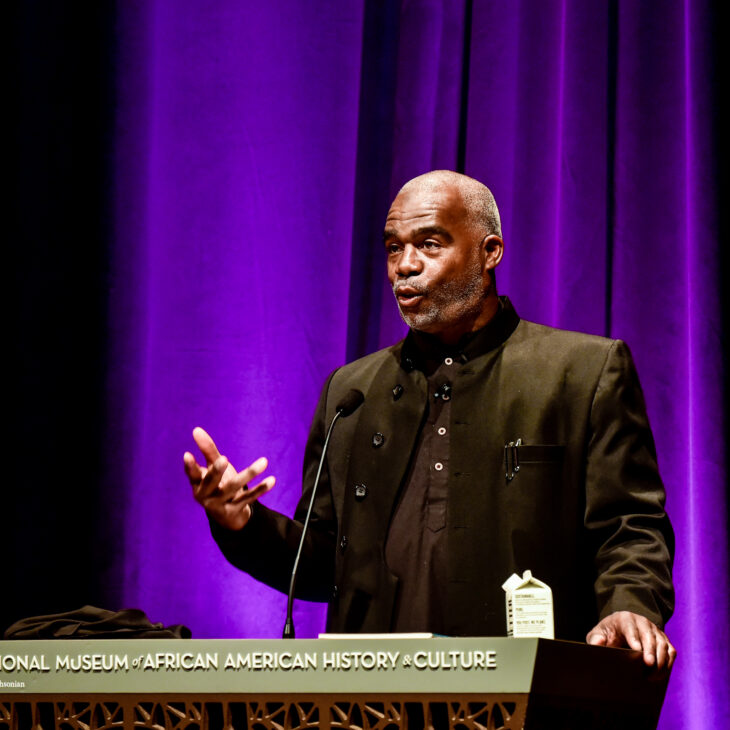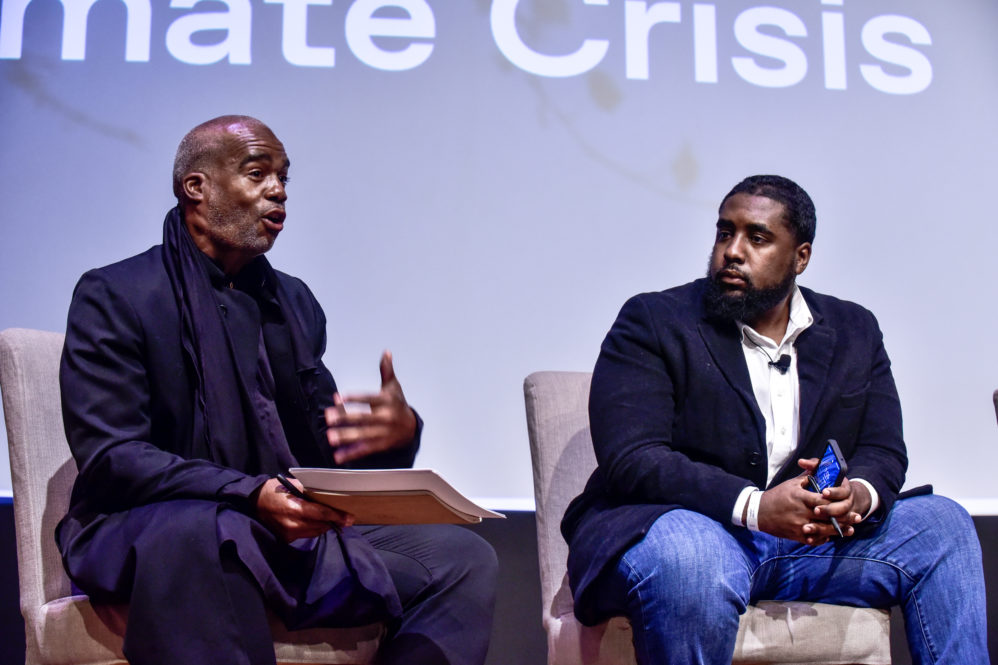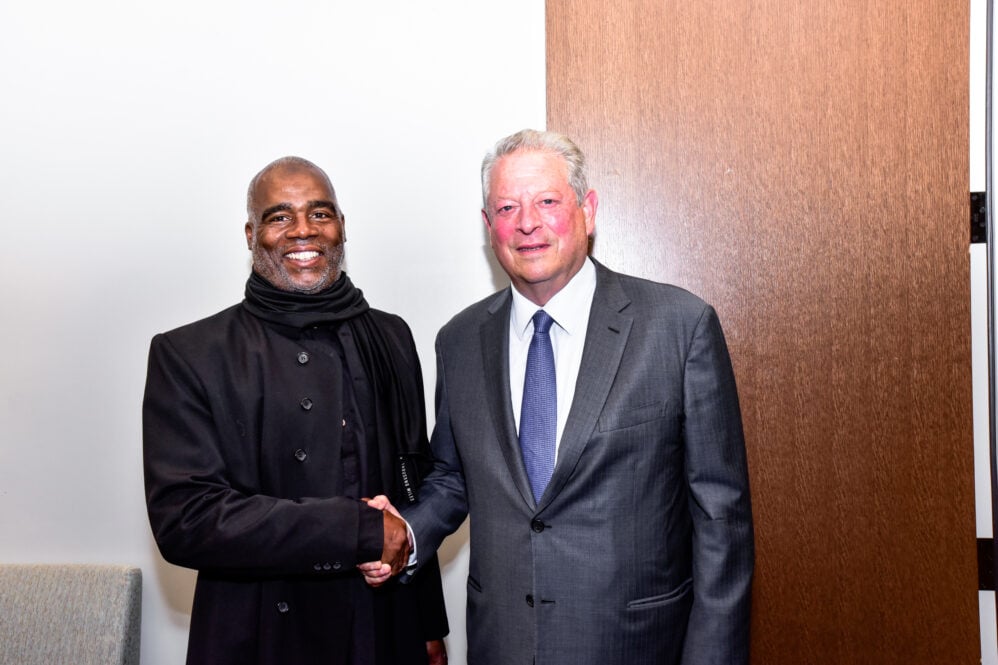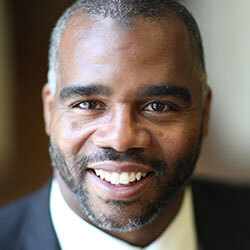A Message from an Ancient Future
September 19, 2022

Ibrahim Abdul-Matin’s speech was given at the Black Interfaith in the Time of Climate Crisis event at the Smithsonian’s National Museum of African American History and Culture in May 2022. Interfaith America’s Black Interfaith Project is proud to partner with Union Theological Seminary’s Center for Earth Ethics for this special event where former Vice President of the United States Al Gore keynoted and where a diverse panel of speakers were featured, including Black Interfaith Fellow Ibrahim Abdul-Matin.
We Speak to The Pharaohs
قَالَ رَبِّ اشْرَحْ لِي صَدْرِي وَيَسِّرْ لِي أَمْرِي وَاحْلُلْ عُقْدَةً مِّن لِّسَانِي يَفْقَهُوا قَوْلِي
“[Moses] said, My Lord, Expand for me my breast (or open my heart), ease for me (make easy) my task and untie (loosen) the knot from my tongue that they may understand my speech.”
So let us begin today not as ones sitting in judgement. You are not better than another person here. In my tradition, in Islam we know that one’s wealth or possessions or accumulation of things is not what gives us any value. Islam sees each individual human being as having intrinsic value and worth. Your soul is what makes you special, not what you make or use or what you can buy or what you look like. So, we start today acknowledging that as we sit here today all the things in the known universe, every action that has happened, every movement of even the smallest quark to the largest quasar has all occurred for this moment to happen here and now. If we gently look around the room and make eye contact, that every single one of us was brought here in this room through all of history and all of time for this moment to happen right now. We must understand that all of our souls, not these bodies, not this presentation of ourselves, our souls were meant and written by the Creator of the Universe to be in community with one another.
I just want also extend my blessings to all the people in the room, the team at Interfaith America, my mom and dad are here so please give them some snaps. I also just want to be clear about some things. Just because sometimes people make assumptions.
So, I am Muslim, and what do we believe?
We believe most fundamentally in the Oneness of God
In Green Deen, in my book, I talk about the idea of Tawhid, which is that we acknowledge the Oneness of God and His creation. So if you are standing at the top of a mountain, which many of you have done, or you are standing at the edge of a great sea and you sigh and say, “look what God has created” you are actually acknowledging ‘look what I am connected to’, ‘look what I am a part of’. Because you like that sunset, you like that mountaintop, you like that meadow and those rolling hills in Upstate New York, you are created.
We Believe in the Angels of God
In Islam, we believe that angels are pure and spiritually obedient beings, created by God to fulfill His commands.
We Belief in the Revelations (Books) of God
Muslims believe in the Revelations sent by Almighty God to His Prophets, including the Qur’an, the Torah, the Gospel, the Scrolls of Abraham and of course, my Aunt Dell’s favorite who lived out here in Scottsburg, Virginia, the Psalms of David.
We Believe in the Prophets of God
All Messengers and Prophets of God such as Noah, Moses, Solomon, Jesus – even the ones we don’t know about, the ones whose stories are not written.
We Believe in the Day of Judgment
Muslims believe in an appointed Day of Judgment and in Heaven and Hell. And, unlike some of your faiths, we don’t know if we are going to go [to heaven] or not. So everyday we don’t know what’s going on!
We Believe in Resurrection after Death
And that we will be called to account for what we did.
I say all so that you understand what I often call my cosmology… and by cosmology, I mean how I understand the science of the origin and development of the universe.
The Creator of the Universe created both the seen world and the unseen world. Among God’s creations in the unseen world are the Angels and the Jinn. The “Jinn”’ are supernatural creatures that exist in a world parallel to our own. Almost every culture boasts stories and legends of unseen creatures. Without diverging too much into this conversation in Islam, Jinn can be both good and evil. We have different words and names for these entities in all of our traditions but I want to say clearly, so that all being present might understand and know If there are demons and evil spirits in this room and in this space, leave. I tell you to leave. Your whisperings, your enmity, your doubt, your lies, your hearsay, all of that negative energy is not welcome here.
What do I mean when I say a Message from the Ancient Future?
In Jeremiah 6:16 it says:
“Stand at the crossroads and look;
ask for the ancient paths,
ask where the good way is, and walk in it,
and you will find rest for your souls.
When we talk about walking, we are not talking about “I’m a pedestrian walking,” right? We’re talking about, “that’s the path and you walk in that path, that’s The Way and you walk in that way.” In Islam, we say Deen – your deen is your path or your way of life. In this context I want to bring us to this point and the idea of a crossroads.
As Black people in the country, there have always been crossroads in our context and our existence. There was a crossroad when the European invaders came to Africa and whispered into the ears of tribal leaders, at that crossroads, those tribal leaders could have said, “No, we are not listening to you. We will not fight the neighboring tribe, even if we don’t share a religion with them, even if we don’t share a language with them, we will not fight them and sell them, our captives, [to you] into slavery.” But we made a different choice. Sadly, most of us were put into slavery because of greed, and of malice and negative thoughts and those negative ideas. There was a crossroads here, later, on this soil, when some chose to rebel, and mostly they died. When they fought back, and they fought hard but they didn’t win.
There was a crossroads when people like Black Moses, when she called to many of them, “Let’s go! We’re going now!” and some of them said, “No, I’m staying.” And some of them went, some of the members of my family made it all the way up to Canada. Before the Civil War they established an entire thriving community, and apparently, they built some amazing furniture. Imagine rocking in one of those rocking chairs?
There was a crossroads for freed men and women like George Washington Carver, who I acknowledge is one of the godfathers of the EJ [Environmental Justice] movement. Became the best in the world at taking their knowledge of the natural world and understanding how to use the scientific method to become legends of science and environmental stewardship.
They put Black and Brown people at the center of deciding how the natural world around them should be used in a way that does not hurt, maim, destroy, or kill. He is the godfather of how to use science to the best of our abilities. Instead of using science to create weapons, using science to understand the most [about Creation] because science at that level is literally a form of worship.
We are at a crossroads now.
And we often like to think about what is the state of Black America? What is the state of our people? And oftentimes when we want to ask that question we get into statistics. And sadly if you go back ten years, twenty years, thirty years, forty years, fifty years the statistics are still the same. It’s depressing. If you are a black male, I am 45, it is depressing. I grew up in the crack era. There were literally bullets flying around. We were protected, our parents took care of us, but around us it was dangerous, but it feels like that again. So why do we keep going in this cycle?
One indicator that I want to call our attention to, the Urban League talks about the attack on voting rights. And to connect that to the climate crisis, why do you think black and brown people are not as consistent voters? Partially, because the climate crisis is pushing people out of their homes. Forcing people into migration that they do not necessarily want to do. It is much easier to vote when you have been voting at the same polling place for the last 30 years. But if you have to constantly change where you are voting and you have to move to another city and move to another place one of the last thing on your list is “I’m going to go sign up to vote.” The more we have the climate crisis the more voting rights are going to be under attack. The more people are going to be disenfranchised.
I also want to bring us to a point I think in terms of our folks, Black folks, one great indicator of us, right now, as always, is culture. One way that we understand, “where we are at” is in terms of culture. Now some of you have listened to the new Kendrick Lamar album. Okay, some of you, some of you have also listened to the new Black Star album,I just want to see, no, not as many.
So, I want to lean in there for a second. But I will take a little detour into the very beginnings of hip hop when in the rubble of the Bronx and the rubble of New York City, when “the Bronx was burning,” what did we do?
Share
Related Articles
Racial Equity
Why Black Faith Leaders Are Crucial in the Fight for Environmental Justice
American Civic Life
God, Country and the Golden Rule: A Conversation with Paul D. Miller
Interfaith Inspiration

ibrahim abdul-matin (l) and William J. Barber III in panel discussion. Photo ©John Drew
We were at a crossroads.
What did we do? We made art. We painted on the walls. We danced to resolve disputes. We used all sorts of machinery and made amazing sounds. We made a decision in that moment, we chose an ancient path and created something beautiful out of nothing. Right, and at the same time, and Vice President Gore referenced this in his earlier comments referenced this, at the same time in North Carolina there were a group of black churchwomen in Warren County laid their bodies on a road before dump trucks carrying contaminated soil with highly toxic PCBs (polychlorinated biphenyls) to block their progress. That was the beginning of the modern environmental justice movement.
At the same time, we [Black people] were birthing hip hop – we were also birthing the EJ movement.
Later on as hip hop was reaching its Golden Age – in 1987 – the United Church of Christ Commission on Racial Justice issued its groundbreaking report on race and toxic waste in the United States. They framed environmental “racism,” people had never articulated it in that way before. Every moment that we have been transforming our relationship to the planet, to the earth, we make beautiful art, beautiful music, and beautiful culture. That’s how we operate. So, what’s the state of our music, our vibe, culture right now? I will bring it back to Kendrick Lamar’s album, and if there’s a thesis of his album it is: don’t tap dance around the difficult conversations.
He has some real tough conversations in that album. He meets us where we are at. And right now, just so I don’t tap dance around it, the #1 contributor to climate change on the planet earth today is the United States Department of Defense. We can’t tap dance around that.
People of faith have to call that out. We have to say: Why is this the reality? If we are truly united as people of faith, as Black people of faith, we are an integral part of the military in this country. Every single person in here has a family member that is in the military or was in the military. What that tells me is that we have an opportunity. There’s an opportunity for those folks to lead when they come out of the military – to build a world that doesn’t need a military – particularly folks that are connected to faith traditions.
Can’t tap dance around that. The question is: at THIS crossroads, what decision are we going to make?
And if you are listening to the Black Star album, Mos Def, Yasin Bey says, “God gave us the design and we assembled the Ark/ it was water then but it will be fire next time.”
Moses went to the top of the mountain and what did he do? He talked to the “burning bush.” The bush was burning but it was the voice of God. But now the whole Earth is burning – are we paying attention? Are we listening to what the Earth is saying? Are we listening to the sound, and are we paying attention deeply – in our hearts?

Ibrahim Abdul-Matin (l) with former VP Al Gore at the event. Photo ©John Drew 2022
There’s a couple of things I want to end with. We all come from different traditions, I was recently reading Bryant Terry’s latest book about Black food, and it talks about all different types of Black food. And I was a little offended that there wasn’t a bean pie in there! I was like, “how can you have a book about black food and have no bean pie?!” There wasn’t anything about fried fish in there – doesn’t make sense. Maybe I should make him some bean pie!
The thread I really want to hammer. The next part, when Moses was speaking to God, and when God told Moses to go to Pharaoh. And we have consistently as Black Americans, and as people of faith, we have been asked to go to Pharaoh time and time again! We have been in the house of Pharaoh, we literally helped build his house, just like Moses helped build and maintain the house of Pharaoh and time and time again we have been forced to speak truth to that power and hold it accountable. It is exhausting. For some of the elders in this room you’ve been doing this for 30 and 40 and 50 years! God bless you. We are constantly having to do this. And what we see right now are young people that are refusing to participate [in faith traditions and in movement work] so we have work to do as people of faith. Some of them are checking out of the conversation. We have to pull them back in and make sure they are equipped to speak to Pharaohs. Just like Harriet Tubman spoke to Pharaohs and spoke truth to power. Not only did she drag people out of slavery, she went with arm guards, with members of the 54th [Massachusetts] Regiment down to South Carolina and liberated people directly out of slave plantations. Are we ready to do this? Are we ready to speak to Pharaohs?
Are we ready to stand up and speak that Truth to power? And the only way we are going to be ready is if we are not divided and conquered. Because like I said in the beginning, the only way they could come into Africa, to take us out of that situation, the only way Tacky’s Rebellion in Jamaica could get destroyed and defeated, was because we were divided and conquered. Our unity is our strength. So, the next thing Moses says is grant me a helper from my family, Aaron [Harun in Arabic],
“Strengthen me through him and let him share my task”
So I am asking every single Black person, every single person of color, every single person that is in this room, every person that is listening to this live… this is a “message from the ancient future,” a message while we are at this crossroads, we are looking into the past and seeing those roads we could have taken, and we are going to remember those roads and we are going to make the right decision. We can say no to the whispering, we can tell the evil spirits to get out of this room, we can say this is my brother, this is my sister, you might be Buddhist, you might be Ifá, Candomblé, you might be Christian, you might not have a faith, but we must be united if we are going to figure this out if we are going to go to Pharaoh.
See the future in front of us where we are going to be shocked that we used clean water for toilets, to put your waste in? Shocked. People were hungry? Shocked. People didn’t have homes? Shocked. You let people go without love? Naw, that doesn’t make sense.
This is a message from the future, the ancient future. We have these paths that have been laid for us, let’s follow them. If you are in any faith then practice your faith, don’t tell anyone what to do with theirs. Get into your own groove. Follow your traditions. Follow your path. Let yourself go where the Truth leads you.
I hope that I made sense today. Did I make sense?
Someone recently told me that there’s an analogy that climate change has to cancer. Right, cancer is inflammation and causes tumors. There’s this language that we want to beat cancer. But my friend, well that’s not the approach she took. Her prayer was to ask God, “what can I learn from this without it killing me. And how can I learn the lesson of this unleashing of this wildness of this cancer and learn how to push it back down and at the same time grow and be better.”
So we have a beautiful challenge in front of us. An existential challenge, God Willing we are up to the task.
Anything that I have said that is useful or beneficial comes from the Creator of the Universe, and anything that is wrong or inappropriate that comes directly from me so please forgive me.

Ibrahim Abdul-Matin
Ibrahim Abdul-Matin is an Interfaith America Senior Fellow. He serves as a Senior Fellow with New Yorkers for Clean Power, serves on the NYS Advisory Board of the Trust for Public Land and is the author of “Green Deen: What Islam Teaches About Protecting the Planet.”



